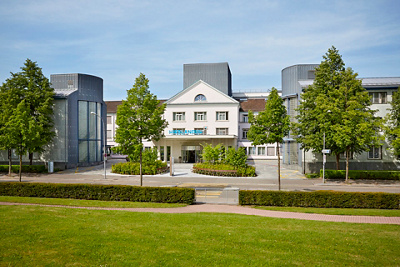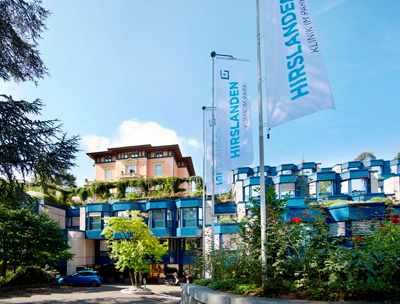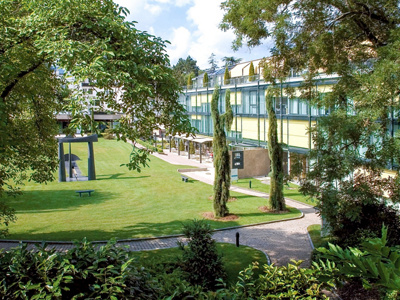In most cases, the reason for unwanted childlessness is not a complete infertility of the couple, but a fertility disorder. This can be treated by a variety of medical care strategies. All treatments at Hirslanden are tailored to your individual needs.
They range from hormonal treatments, through conservation measures such as Social Egg Freezing and sperm preservation, to IVF treatment with ICSI and pre-implantation diagnostics.
Are you interested in fertility treatment in Switzerland? Our specialists have decades of experience in the field of fertility and are specially trained in dealing with the different cultural requirements and expectations of international patients.
Causes of unwanted childlessness
Causes of unwanted childlessness
The causes of unwanted childlessness are manifold and are often due to a combination of several factors:
- Male cause (reduced sperm quality)
- Anatomically conditioned (due to various typical underlying diseases e.g. blocked fallopian tubes after infections, endometriosis, adenomyosis, myomas, polyps, Asherman syndrome etc.)
- Hormonally conditioned (problems with the pituitary gland, PCOS, diabetes mellitus, levels of male hormones too high, prolactin elevation, thyroid diseases etc.)
- Age-related (decreasing female fertility from the age of 35)
Initial consultation and examinations for those desiring to have children
Initial consultation and examination
A first consultation provides information about the initial situation and treatment options. Based on the initial discussion, our doctors will estimate realistic chances of success and define the first steps of treatment.
Compulsory basic checks decide on the chances of success of an artificial insemination:
- Hormone panel, infection screening, 3D basic ultrasound
- Clarification of the fallopian tubes and uterus
- Spermiogram
Based on the results of the examination and the interviews, a personalised care strategy will be developed for you.
Artificial insemination methods: in vitro fertilisation and ICSI
In vitro fertilisation and ICSI
The most common method of infertility treatment is in vitro fertilisation (IVF treatment). In this method, fertilisation of the egg cell does not take place in the woman's body, but "artificially" in the laboratory.
In case of affected sperm quality of the man, the related ICSI method is used, which differs in introducing the sperm into the egg rather than fertilise the egg in a laboratory.
In addition to the best-known fertility methods, alternative methods can also be recommended. Our specialists at Hirslanden International will be happy to advise you.
Requirements
Requirements
In order to be able to carry out IVF or ICSI treatment, the following requirements must be fulfilled:
- Basic data exists (hormone examination of the woman, ultrasound, spermiogram)
- Age of the woman maximum between 43-44 years, age of the man maximum 63-65 years
- Negative HIV, hepatitis B/C, syphilis status of both partners
- Proven immunity to rubella and chickenpox
- Stable partnership (the couple does not have to be married)
The selection of embryos by sex or external characteristics is prohibited by law in Switzerland.
Success rates of artificial insemination
Success Rates of artificial insemination
The probability of success depends primarily on the age of the woman and her individual ovarian reserve. From the age of 35, the chances of success start to decrease and are halved by the age of 40.
The individual ovarian reserve is determined more precisely during the clarification phase by means of three tests:
- Anti-Muller Hormone, AMH
- Follicle stimulating hormone, FSH
- Antral Follicle Count, AFC
On the basis of these results, your doctor can give you a personal and relatively precise assessment of the chances of success of fulfilling your desire to have children.
With sufficient sperm quality, the pregnancy rate with ICSI is comparable with the one of conventional IVF. However, ICSI can be effective if conventional IVF does not fertilise eggs despite normal sperm examination.
If male fertility is limited or previous insemination or IVF treatments have failed, ICSI should definitely be used.
Risks
Risks
Artificial insemination does not automatically lead to pregnancy, and an unfulfilled pregnancy can be a psychological burden for the couples concerned. Before any treatment, your doctor will therefore always discuss your fears, worries and expectations and inform you and your partner about the further procedure.
In order to retrieve the egg, a small ambulant procedure under short anesthesia must be performed. With the procedure, the rare risks associated with this must be taken into account.
Detailed information on the most common methods of artificial insemination can be found directly under IVF treatment and ICSI. Our specialists at Hirslanden International will be happy to advise you in advance.
Fertility clinics in Switzerland
Our fertility clinics are equipped with modern infrastructure and offer specialised and highly specialised medicine in line with the latest medical developments.






